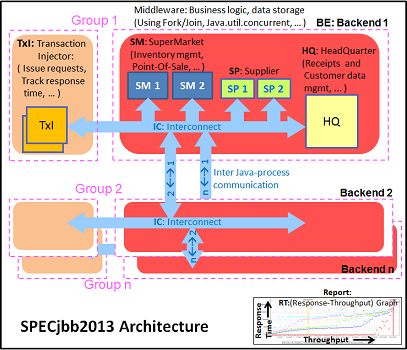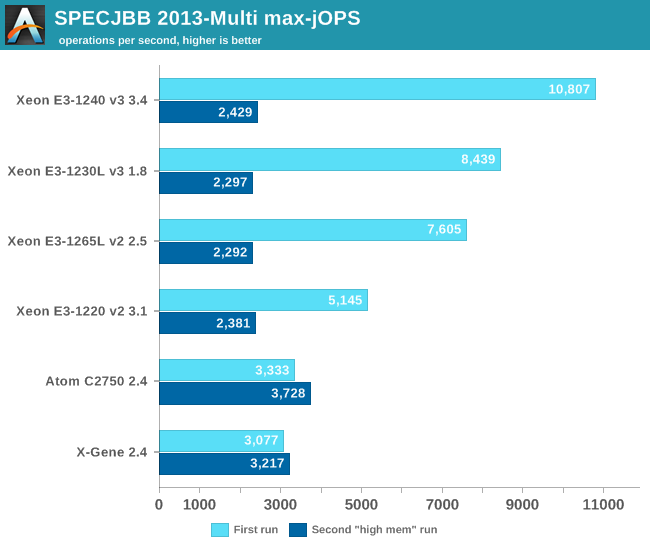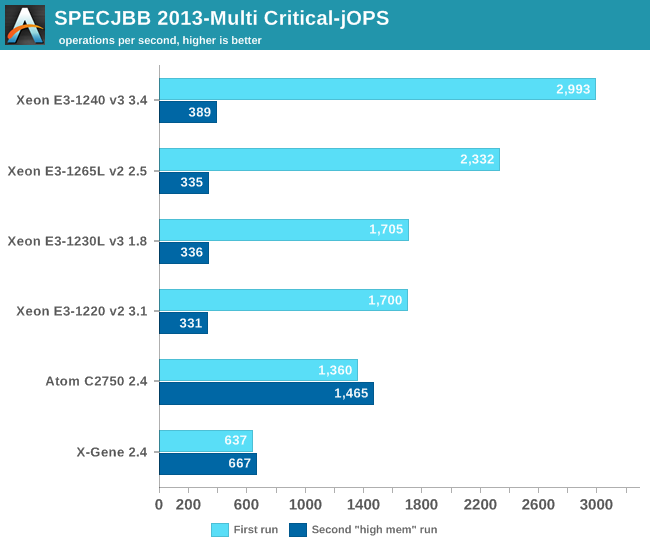X-Gene 1, Atom C2000 and Xeon E3: Exploring the Scale-Out Server World
by Johan De Gelas on March 9, 2015 2:00 PM ESTJava Server Performance
The SPECjbb 2013 benchmark has "a usage model based on a world-wide supermarket company with an IT infrastructure that handles a mix of point-of-sale requests, online purchases, and data-mining operations." It uses the latest Java 7 features and makes use of XML, compressed communication, and messaging with security.

We tested with four groups of transaction injectors and back-ends. We applied a relatively basic tuning to mimic real-world use. Our first run was done with a low amount of memory:
"-server -Xmx4G -Xms4G -Xmn2G -XX:+AlwaysPreTouch -XX:+UseLargePages"
With these settings, the benchmark takes about 20-27GB of RAM. In our second run, we doubled the amount of memory to see if more memory (64GB vs. 32GB) can boost performance even more:
"-server -Xmx8G -Xms8G -Xmn4G -XX:+AlwaysPreTouch -XX:+UseLargePages"
With these settings, the benchmark takes about 43-57GB of RAM. The first metric is basically maximum throughput.

Assigning more memory to your Java VMs than what you have available is of course a bad idea, but now we have some numbers you can use to convince you coworkers of this fact. Although the Atom C2750 and X-Gene perform a little better thanks to fact that they can address twice as much RAM, they are nowhere near the performance of a Xeon E3-1230L if the latter is configured properly.
The Critical-jOPS metric is a throughput metric under response time constraint.

The Xeon E3 Haswell core continues to outperform the Atom by a tangible margin. The X-Gene fails to compete with the Intel SoCs. The conclusion is pretty simple: Java applications run best on a Haswell or Ivy Bridge core.










47 Comments
View All Comments
gdansk - Monday, March 9, 2015 - link
xgene is not looking so great. Even if it is 50% more efficient as they promise they'll still be behind Atom.Samus - Monday, March 9, 2015 - link
HP Moonshot chassis are still *drool*Krysto - Monday, March 9, 2015 - link
The main problem with the non-Intel systems is not only that they use older processes compared to Intel, but that they use older processes even compared to the rest of the non-Intel chip industry. AMD is typically always behind 1 process node among non-Intel chip makers. If they'd at least use the cutting edge processes as they become available from non-Intel processes, maybe they'd stand a chance, especially now that the gap in process technologies is shrinking.Samus - Monday, March 9, 2015 - link
AMD simply isn't as bad as people continually make them out to be. Yes, they're "behind" Intel but it's all in the approach. We are talking about two engineering houses that share nothing in common but a cross licensing agreement. AMD has very competitive CPU's to Intel's i5's for nearly half the price, but yes, they use more power (at times 1/3 more.)But facts are facts: AMD is the second high-tech CPU manufacture in the world. Not Qualcomm, not Samsung. It's pretty obvious AMD engineering talent spreads more diversity than anyone other than Intel, and potentially superior to Intel on GPU design (although this has obviously been shifting over the years as Intel hires more "GPU talent.")
AMD in servers is a hard pill to swallow though. If purchasing based on price alone, it can be a compelling alternative, but for rack space or low-energy computing?
Taneli - Tuesday, March 10, 2015 - link
AMD doesn't even make it in top 10 semiconductor companies in sales. Qualcomm is three, Samsung semicondutors six and Intel almost ten times the size of AMD.Outside of the gaming consoles they are being completely overrun by competition.
owan - Tuesday, March 10, 2015 - link
I'm sorry, at one point I was an AMD fanboy, back when they actually deserved it based on their products, but you just sound like an apologist. Facts are the facts, FX processors aren't competitive with i5's in performance or power or performance/$ because they get smacked so hard they can't be cheap enough to make up for it. Their CPU designs are woefully out of date, their APU's are bandwidth starved and use way too much power to be useful in the one place they'd be great (mobile), and their lagging process tech means theres not much better coming on the horizon. I don't want to see them go, but at the rate ARM is eating up general computing share, it won't be long before AMD becomes completely irrelevant. It will be Intel vs. ARM and AMD will be an afterthought.xenol - Wednesday, March 11, 2015 - link
Qualcomm is used in pretty much used in most cell phones in the US to the point you'd think Qualcomm is the only SoC manufacturer. I'm pretty sure that's also how it looks in most of the other markets as Korea. Plus even if their SoCs aren't being used, they're modems are heavily used.If anything, Qualcomm is bigger than AMD. Or rather, Qualcomm is the Intel of the SoC market.
xenol - Wednesday, March 11, 2015 - link
[Response to myself since I can't edit]Qualcomm's next major competitor is Apple. But that's about it.
Also I meant to say other markets except Korea.
CajunArson - Monday, March 9, 2015 - link
Bear in mind that the Atom parts were commercially available in 2013, so they are by no means brand-new technology and the 14nm Atom upgrades will definitely help power efficiency even if raw performance doesn't jump a whole lot.Anandtech is also a bit behind the curve because Intel is about to release Xeon-D (8 Broadwell cores and integrated I/O in a 45 watt TDP, or lower), which is designed for exactly this type of workload and is going to massively improve performance in the low-power envelope sphere:
http://techreport.com/review/27928/intel-xeon-d-br...
SarahKerrigan - Monday, March 9, 2015 - link
14nm server Atom isn't coming.http://www.eetimes.com/document.asp?doc_id=1325955
"Atom will become a consumer only SoC."